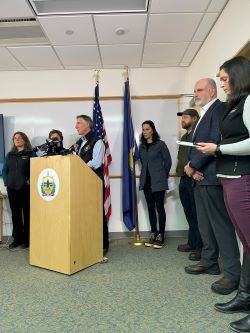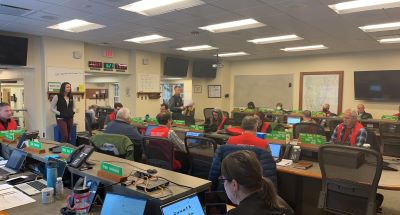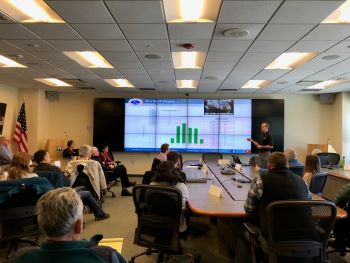
January, 2023
Volume 17 Issue 1
**Best viewed on a computer browser or horizontally if you are on a smart phone**
Vermont Requests Federal Damage Assessment - Significant Step Before Requesting Disaster Declaration
Vermont Emergency Management (VEM) Director Erica Bornemann has requested a Preliminary Damage Assessment (PDA) from the Federal Emergency Management Agency to determine if the state qualifies for a federal major disaster declaration following power outages and other damage from the December 23-24, 2022 storm. The request asks for assessments in Addison, Caledonia, Chittenden, Essex, Franklin, Grand Isle, and Orleans counties. Additional counties could be added to the request as data collection continues.
“This storm was significant for Vermonters and Vermont’s utilities,” Vermont Emergency Management Director Erica Bornemann said. “Municipal, non-profit, and public utilities worked for several days to restore electric service to tens of thousands of customers in rural areas of Vermont. Some smaller electric departments spent hundreds of thousands to over a million dollars on repairs, far exceeding their yearly budgets for emergency work.”
A federal Public Assistance disaster declaration could reimburse municipal and non-profit utilities for 75% of restoration costs. A declaration could also reimburse municipalities for 75% of their costs for things like debris removal, road repairs, and staff overtime cleaning up after the storm.
Vermont officials have identified more than $2 million in costs incurred by utilities and communities and assessments are on-going. To qualify for a major disaster declaration Vermont must show at least $1.14 million in response and public infrastructure recovery costs. Individual counties must also show public infrastructure damages and recovery costs of $4.44 per capita, which includes the cost of power restoration in municipal utility service areas. FEMA must validate the damage estimates before the Governor can request a disaster declaration.
The assessments will begin the week of January 9 and predominantly entail reviewing financial records with utilities.
For more information on the Public Assistance Program visit https://vem.vermont.gov/funding/pa
Storm response recap:
Over 75,000 power outages were reported across the state.
20 shelters and warming centers open, including three run or supported by the American Red Cross and seven supported by the Vermont National Guard.
Agency of Transportation crews plowed 66,920 lane miles; and applied 5,538 gallons of magnesium chloride, 74,128 gallons of sodium chloride, and 6,118 tons of winter salt.
Over the activation period beginning Friday December 23, 2022 at 8:00 a.m., the State Emergency Operations Center responded to 86 calls from local emergency management officials regarding power outages, and other storm-related needs at essential infrastructure including healthcare facilities and correctional institutions.
The Vermont State Police responded to 73 storm-related incidents.
The State Emergency Operation Center (SEOC) included representatives from the Agency of Human Services, Agency of Transportation, Agency of Digital Services Public Service Department, Department of Health, Vermont State Police, Division of Fire Safety, Urban Search and Rescue, Department of Environmental Conservation, Department Forest Parks & Recreation, Vermont National Guard, American Red Cross, Vermont 211, Green Mountain Power, Washington Electric Co-Op, Vermont Electric Co-Op, and more.
Homeland Security Grant Request for Proposals Opening Soon
The beginning of the Request for Proposal period for the 2023 State Homeland Security Grant Program (SHSP) and Operation Stonegarden Grant Program (OPSG) is anticipated to open in mid-January. SHP and OPSG are encompassed under the Homeland Security Grant Program (HSGP). The FY23 Nonprofit Security Grant Program anticipated to open in the coming months.
The HSGP is intended to prevent terrorism and other catastrophic events, and to prepare the Nation for the threats and hazards that pose the greatest risk to the security of the United States. Ideally, funding should support deployable assets that can be used anywhere in the nation through automatic assistance and mutual aid agreements, including, but not limited to, the Emergency Management Assistance Compact (EMAC).
The HSGP funding supports investments that improve the ability of jurisdictions nationwide to:
- Prevent a threatened or an actual act of terrorism,
- Prepare for all hazards and threats,
- Protect citizens, residents, visitors, and assets against the greatest threats and hazards, relating to acts of terrorism, and/or
- Respond quickly to save lives, protect property and the environment, and meet basic human needs in the aftermath of an act of terrorism or other catastrophic incidents.
The Nonprofit Security Grant Program provides funding support for target hardening and other physical security enhancements and activities to nonprofit organizations that are at high risk of terrorist attack. The intent is to integrate nonprofit preparedness activities with broader state and local preparedness efforts. It is also designed to promote coordination and collaboration in emergency preparedness activities among public and private community representatives, as well as state and local government agencies.
For more information and to apply to the grant programs when the open, please visit the Vermont Homeland Security Unit website at https://hsu.vermont.gov/homeland-security-unit/funding-opportunities
To receive funding announcements when these opportunities go live please consider subscribing to the VEM Funding listserv which can be found here: https://vem.vermont.gov/email-lists
Spring Flood Seminars
The annual Spring Flood Seminar will be held virtually through Microsoft Teams on January 25th, 12:30-4pm.
This event will provide information to local officials about the upcoming flood season, and how to prepare for, respond to, and recover from seasonal flooding.
Presentations will be provided by the National Weather Service, Agency of Transportation District Maintenance and Fleet Division, Agency of Natural Resources Rivers Program, Urban Search & Rescue, State HAZMAT Team, Division of Fire Safety, Vermont National Guard, Regional Planning Commissions, and Vermont Emergency Management. These presentations will be recorded and a link to the presentations will be shared on our website on January 26th.
Following the virtual Spring Flood Seminar, we will hold 3 virtual regional question & answer sessions:
February 7th, 12-1pm: Spring Flood Q&A – Northeast. Washington, Lamoille, Orleans, Essex & Caledonia counties.
February 8th, 12-1pm: Spring Flood Q&A – South. Bennington, Windham, Windsor, Orange, and Rutland counties.
February 9th, 12-1pm: Spring Flood Q&A – Northwest. Franklin, Grand Isle, Chittenden & Addison counties.
During these sessions, you will receive an update from the National Weather Service tailored to your region and can ask questions of the individuals serving that region from the Agency of Transportation District Maintenance and Fleet Division, Agency of Natural Resources Rivers Program, Urban Search & Rescue, State HAZMAT Team, Division of Fire Safety, Vermont National Guard, Regional Planning Commissions, and Vermont Emergency Management. Please make sure to view the recorded presentations before attending these events and come prepared with questions!
Registration is not required for any of these events – simply click the corresponding link at the time noted above.
If you have any questions, please reach out to Emily.Harris@vermont.gov.
COVID-19 Funding Available for Arts and Cultural Organizations
Training
Connecticut River Valley Grant Funding Workshop Navigating conservation funding opportunities in Vermont’s Connecticut River Valley
January 25, 2023
9:00 a.m. – 3:00 p.m.
Cornerstone Community Center, 14 Elk Street, Hartford, VT
Registration and Additional Details
With a myriad of funding opportunities currently available, it can be difficult to identify the right grant program to meet your project needs. This half-day workshop aims to bring together various federal, state, and philanthropic partners who will share important details about upcoming conservation grant announcements that will support project work in the Connecticut River Valley watershed of Vermont. You will hear directly from funders, learn important tips for creating a competitive proposal, find ways to connect with potential match, and have a chance to talk about specific project ideas with funders
Federal Partners
National Emergency Management Basic Academy Train-the-Trainer
The Basic Academy Train-the-Trainer consists of 2 days of discussions about course objectives, how to set up and facilitate the class, time management, and other general topics. The last 3 days consist of student teach-backs that describe activities and exercises to demonstrate students’ grasp of the Basic Academy course subject matter. The goal of the Basic Academy Train-the-Trainer is to provide a sound and consistent basis for new instructors to learn to teach foundational concepts of emergency management and develop skills in planning, exercises, and public information and warning.
LOCATION: San Antonio, TX
DATE/TIME: May 1-5, 2023 (travel dates April 30 & May 6)
PREREQUISITE: Five years of experience in Emergency Management, Three years of classroom training experience in adult learning, It is recommended to complete the Basic Academy curriculum before taking this course.
REGISTRATION/DETAILS: L011 National Emergency Management Basic Academy Train-the-Trainer
Vermont/Virtual
Most trainings require a Learning Management System(LMS) account. If you don’t have an account, you can register for one at the following link: https://vermont.csod.com/selfreg/register.aspx?c=%255e%255e%255eQGm2wxcSUvINsXvXjRYs1A%253d%253d
January 2023
2023 River Ice Spotter Training
The focus of the training will be on monitoring and reporting river ice. The target audience is local officials and Fire Chiefs who can provide real-time observations on river conditions in their communities. This information is used by the NWS, USACE, USGS, State and Local officials in our efforts to prepare and alert communities of threats posed by ice jam flooding. The training will be recorded if you are unable to attend at the scheduled time. Please contact sarah.jamison@noaa.gov or john.goff@noaa.gov with any questions.
LOCATION: Virtual
DATE/TIME: January 10, 2023 2:00 – 3:00 p.m.
PREREQUISITE: None
REGISTRATION: https://attendee.gotowebinar.com/register/8725792875379445593
COURSE FLYER
AWR- 228 Community Resilience
Learn about the meaningful actions that you and your community can take to enhance resilience to natural hazards and of the opportunities available to incorporate these actions into professional practice.
LOCATION: Virtual
DATE/TIME: January 18-19, 2023, 1:00 – 5:00 p.m. each day
PREREQUISITE: None
REGISTRATION: University of Hawaii: https://ndptc.hawaii.edu/training/delivery/3228/
Code: 82516
COURSE FLYER
NOTE: Must attend both sessions to receive credit.
Active Shooter Preparedness Webinar
Preparing employees for a potential active shooter event is an integral component of an organization’s incident response planning. Because active shooter incidents are unpredictable and evolve quickly, preparing for and knowing what to do in an active shooter situation can be the difference between life and death. Every second counts.
LOCATION: Virtual
DATE/TIME: January 19, 2023 1:00 p.m. – 3:00 p.m.
PREREQUISITE: None
REGISTRATION: https://www.eventbrite.com/e/cisa-active-shooter-preparedness-webinar-region-1-ctmamenhrivt-registration-475217116187
COURSE FLYER
NOTE: Registration is limited to 350 participants and will close no later than January 18, 2023 at 12:00 p.m.
February 2023
K2020 Debris Management Planning for State, Tribal, Territorial, and Local Officials
This course will better prepare participants to fully plan for, respond to, and recover from major debris-generating events.
LOCATION: Virtual
DATE/TIME: February 7-9, 2023, 8:30 a.m. – 5:00 p.m. each day
PREREQUISITE: None
REGISTRATION: required via NETC online admissions system: https://training.fema.gov/netc_online_admissions/
SEOC Orientation
The purpose of this training is to provide an overview of the State Emergency Operation Center. This course is ONLY available to those who are on the SEOC Roster
LOCATION: DPS Headquarters, Waterbury
DATE/TIME: February 14, 2023, 1:00 p.m. – 3:30 p.m.
PREQUSITE: IS-100 and WebEOC State User Training
REGISTRATION: https://vermont.csod.com/ui/lms-learning-details/app/event/04f1ce01-32df-4658-89d6-eda38e586ef0
Vermont Local Emergency Management Director Course
This course will familiarize local Emergency Management Directors (EMD) and Coordinators (EMC) with major roles, responsibilities, and “how to do it” guidance, across all four phases of Emergency Management.
LOCATION: Virtual
DATE/TIME: February 21-22, 2023, 2:30 - 5:00 p.m. each day
PREREQUISITE: None
REGISTRATION: https://vermont.csod.com/ui/lms-learning-details/app/event/e35883cd-148f-415c-a554-4107b7533679
NOTE: Must attend both sessions to receive credit
G0191- ICS/EOC Interface
This course provides an opportunity for participants to begin developing an effective interface between he Incident Command System(ICS) and the Emergency Operations Center (EOC) for their community by applying ICS principles. This course reviews ICS and EOC responsibilities and functions and depends heavily on exercises and groups discussions to identify interface issues and develop solutions.
LOCATION: Rutland Regional Planning Commission, Rutland
DATE/TIME: February 23, 2023, 8:00 a.m. - 4:30 p.m.
PREREQUISITE: IS-100, IS-200 or IS-2200, IS-700 and IS-800
REGISTRATION: https://vermont.csod.com/ui/lms-learning-details/app/event/70143e5e-658a-429a-86d3-51ec164e51e7
AWR- 347 Climate Adaption Planning for Emergency Management
This course will enhance your ability to discuss the impact of weather hazards on critical infrastructure and key resources, and explain how climate change projects will affect those impacts.
LOCATION: Virtual
DATE/TIME: February 28, 2023 – March 1, 2023, 1:00 – 5:00 p.m. each day
PREREQUISITE: None
REGISTRATION: University of Hawaii: https://ndptc.hawaii.edu/training/delivery/3229/
Code: 79028
NOTE: Must attend both sessions to receive credit

